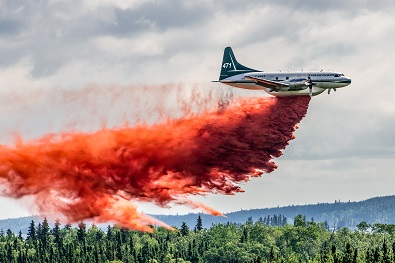What a CV 589A tanker drop looks like. Photo courtesy Saskatchewan Wildfire Management.
Saskatchewan will be sending aircraft and firefighters west to help battle large forest fires in the British Columbia interior.
The province has already sent two 580A air tankers and a bird dog aircraft to Abbotsford. Twenty firefighters and sixteen overhead members will be sent to Kamloops on Tuesday.
There are 231 fires burning across British Columbia, ten of which are dangerously close to communities. More than 10,000 people have been forced from their homes, according to Federal Public Safety Minister Ralph Goodale.
One of the reasons Saskatchewan is able to provide the manpower and aircraft is a below-normal season for wildfires across the north, due to cool and wet conditions both now and in the fall of 2016, said Steve Roberts, the executive director of the provincial Wildfire Management Branch.
“There is only one active fire in the north in the Ile-a-la-Crosse region which is contained and that is good news for Saskatchewan and that means we can support our neighbors upon their request,” he said.
Roberts said some of the crews will be from the Buffalo Narrows area, some will come from as far north as Stony Rapids and other will originate from near Hudson Bay without depleting one whole area of Saskatchewan. An incidence command team, specially trained to look after large fires, will be among the specialists sent to British Columbia to take on larger fires.
Typically, fire crews work on a twelve-day deployment when they have to leave the province to help other jurisdictions, he said. If the crew needs to be replaced upon the request of the BC government, a second 20-man crew will be sent out.
As for the conditions the fire crews will be facing, Roberts said there will be challenges in elevations and slopes and different species of vegetation. He said in Saskatchewan there are more bogs and fens which lead to a different style of firefighting, but there is also “a national training standard for fighting wildfires and that’s why we can exchange them across the country.”
Federal Public Safety Minister Ralph Goodale said Ottawa has agreed to federal assistance. The Canadian Armed Forces are helping residents affected by evacuations and airlift emergency workers and equipment.
Provincial officials in British Columbia expect more gusty winds and hot, dry conditions to fan the flames even more.
